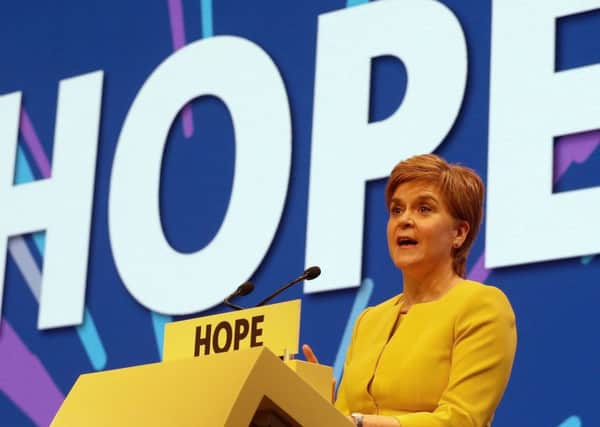IndyRef2: What we know so far


Ministers have now published legislation to set the rules for a possible IndyRef2.
What does that mean? The bill explains how the Scottish Government could stage another referendum. It includes provision for the date, question and referendum period to be set by secondary legislation in the future.
Advertisement
Hide AdAdvertisement
Hide AdWhat does Nicola Sturgeon say? “An independence referendum within this parliamentary term will give Scotland the opportunity to choose to be an independent European nation - rather than have a Brexit future imposed upon us.”
Will it be backed by a majority of MSPs? Yes - thanks to the combined votes of the SNP and Greens.
Does that mean IndyRef2 will definitely happen? No. For a constitutional referendum to be legally binding - meaning the result couldn’t be challenged in the courts - it needs the approval of the UK Government. Simply put, Holyrood does not have the power to hold such a vote on independence. To do so, the Scottish Parliament would need to be loaned the power on a temporary basis - a so-called Section 30 order.
So how can the Scottish Government publish a referendum bill? Crucially, the legislation published today does not mention independence. That means it can’t be struck down by the Scottish Parliament’s presiding officer and a vote can go ahead.
Could Holyrood just hold an independence referendum anyway? In theory, yes. But this would mean, from a legal stand point, it would only be a consultative referendum. Scottish ministers have previously expressed reluctance at following such a path. The regional Catalan government tried something similar - albeit in very different circumstances - in 2017. It led to the devolved government being suspended by Madrid and various politicians jailed. There is no suggestion this would happen in Scotland - but the fact remains that consultative referendums on big constitutional questions can prove to be a legal minefield.
Will Westminster grant a Section 30 order? At the moment, it looks very unlikely. Theresa May has categorically refused to consider it. Her ministers - David Lidington being a recent example - have also flatly said no.
Would a new prime minister grant a Section 30 order? We can’t say for sure until whoever the next Tory leader is takes up the job. But the answer is still likely to be a firm no. The priority of the next prime minister will be to secure Brexit. Following the European election result, the Conservatives know the longer the process drags on, the more they could lose votes to Nigel Farage’s new Brexit party. The last thing a new Tory leader will want is another IndyRef on top of all that.
We had a vote on independence in 2014. Why does the SNP want another one? Nicola Sturgeon has argued that the Brexit vote has changed the UK and that Scotland deserves a chance to preserve its membership of the European Union. Scotland, after all, voted to Remain by a substantial margin. But Unionists argue the Brexit vote does not cancel out the majority who voted for Scotland to remain in the UK in 2014.
Advertisement
Hide AdAdvertisement
Hide AdWhat do other parties say? “Only one in five people in Scotland say they want a referendum under Nicola Sturgeon’s absurd timetable,” said Tory constitutional affairs spokesman Adam Tomkins. “The Scottish Conservatives will always stand up to oppose Nicola Sturgeon’s independence obsession, and say no to more division and uncertainty. It is time we all moved on.”